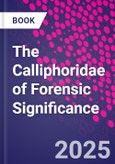The Calliphoridae of Forensic Significance offers a focused and in-depth discussion on the biology, ecology, and behavior of blow flies relevant to medico-legal entomology in North America. Moving from introductory information to advanced applications, this book covers recent developments, current challenges, and research needs for the calliphorids most relevant to forensic entomology and how these topics can influence the use of these insects in the court of law. The book will be useful for students enrolled in forensic entomology, biological forensics, forensic anthropology, and related course work, as well as attorneys and law enforcement that utilize entomological evidence in casework.
Table of Contents
1. Introduction2. Diversity and Taxonomy of Forensically Significant Calliphoridae
3. Evolution of Calliphoridae
4. Genetics of Calliphoridae
5. Behavioral adaptions of larval Calliphoridae
6. Behavioral adaptions of adult Calliphoridae
7. Temperature influences on growth and survival of Calliphoridae
8. Calliphoridae in decomposition ecology
9. Calliphoridae in community succession
10. Calliphoridae in case studies
11. Calliphoridae in facultative myiasis
12. Microbiome of Calliphoridae
13. Pattern evidence produced by Calliphoridae
Authors
David B. Rivers Professor, Department of Biology, Loyola University Maryland, USA.Dr. David B. Rivers is a Professor and Founding Chair in the Department of Forensic Science at Loyola University Maryland. Dr. Rivers is trained as an insect physiologist, cellular parasitologist, and forensic entomologist. He developed the forensic science undergraduate program and graduate programs in Forensic Pattern Evidence (MS) and Biological Forensics (MS) at Loyola. Dr. Rivers is a member of the Entomological Society of America, American Academy of Forensic Sciences, International Association of Identification, International Association of Bloodstain Pattern Analysts, Council of Forensic Science Educators, International Veterinary Forensic Science Association, Cold Case Foundation and Super Sleuths. He has published over 80 peer-reviewed articles, reviews, and book chapters and is also co-author of the critically acclaimed textbook The Science of Forensic Entomology. Dr. Rivers' research examines basic and applied questions involving necrophagous flies and parasitic wasps as they relate to legal investigations. His current work has been focused on characterization of pattern evidence produced by necrophagous Diptera.
John R. Wallace Professor, Department of Biology, Millersville University, USA.Dr. John R. Wallace is a Professor Emeritus in the Department of Biology at Millersville University, Millersville, PA. Dr. Wallace is a trained medical entomologist who maintained 25 years of federal and state funding to study the population dynamics of mosquitoes and other biting insects related to arthropod-borne disease vector ecology as they relate to the control and prevention of disease in urban and rural environments in temperate and tropical regions of the world. Dr. Wallace is one of 19 active Board Certified Forensic Entomologists in North America and a Diplomate with the American Board of Forensic Entomologists as well as a Fellow in the American Academy of Forensic Science. He is a co-founder of the North American Forensic Entomology Association. He has published over 100 peer-reviewed articles, reviews, and book chapters and is co-editor of the textbook Wildlife Forensics: Methods and Applications. His other research interests extend into the field of forensic entomology, specifically how aquatic insects and plants can be utilized to estimate a post-mortem submersion interval.








